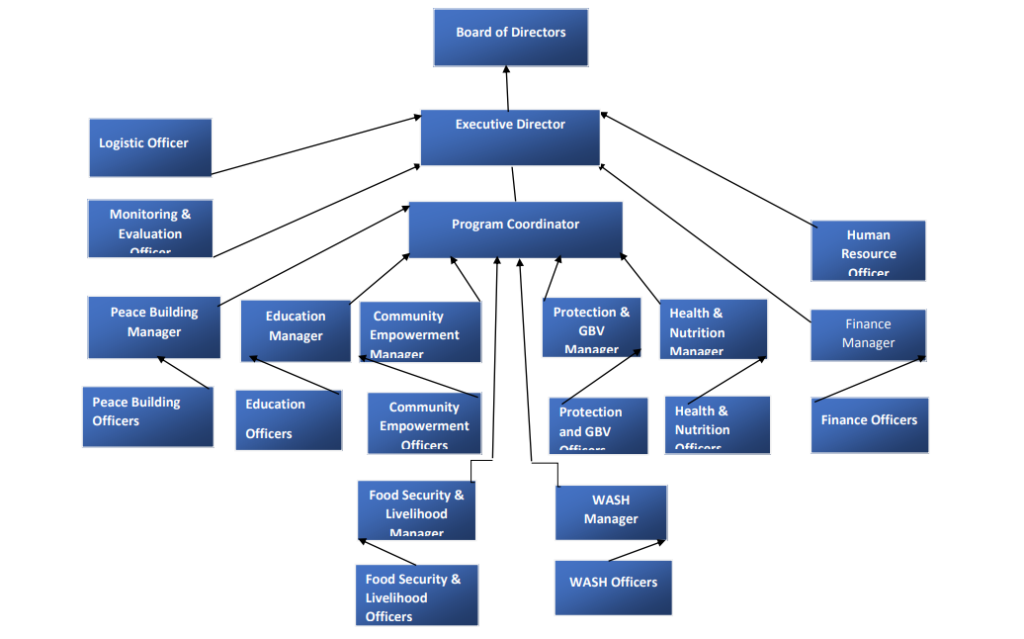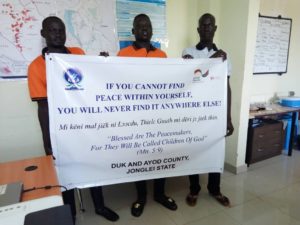Peace in Action & Social Service (PASS)

OPERATIONAL PLAN FOR 2020
Who we are

PASS Staff holding a peace banner after convening peace and reconciliation workshop in Jiech, Ayod-South Sudan…
Peace in Action and Social Service (PASS South Sudan) is a Christian non-governmental organisation registered in South Sudan under the South Sudan Relief and Rehabilitation Commission (SRRC) in 2016, under chapter 3, section 10 of NGO Act 2016. Registration No 543 for its legal operations. PASS has its board of Directors which compromise 7 members. The board meets twice a year to plan and evaluate strengths of the organisation and develop a strategic direction. PASS currently runs the following programmes in South Sudan, while, operating in Fangak and Ayod and Duk Counties, northern Johnglei state, Central Equatoria (Juba) State, Nyirol, Wuoror and Akobo Counties, in the thematic areas of Health and Nutrition, Education in Emergency and long term, child protection and gender based violence (GBV), food security and livelihood FSL, Water, Sanitation and Hygiene (WASH, Peace Building and Conflict Mitigation, Community Empowerment and Education, PASS- South Sudan has offices In Juba.
The Purpose and Identity of PASS
The strategies and activities developed herein are informed by PASS’s stated purpose and identity as promulgated in the statements that are reproduced below:
Vision
Envisage Peaceful and Resilient communities across South Sudan
Mission
Reduce conflicts and build peace through result oriented resilience building activities and social services across communities of South Sudan
Core Values
- Faith
- Respect to dignity and culture
- Transparency and Integrity
- Dedication and Commitment
- Team Work
Overall Goals
Improve unity, reconciliation, social welfare, sustainable development and resiliency position of
different Communities of South Sudan
Competitors
It can be said that PASS is in direct competition with organisations offering similar programmes as far as mobilizing of resources is concerned. The key factors that would provide PASS competitive advantage are efficiency and effectiveness in programme delivery. Additionally, PASS will continuously improve on its visibility by exposing its work widely in order to compete effectively for resources. By addressing the weaknesses noted in the next section, PASS can also become more attractive to potential supporters.
Internal Strengths and Weaknesses
Strengths
The planning process identified the following as the major strengths of PASS:
- PASS has an appropriate legal framework and an effective governance structure.
- The leadership is able to be a good spokesperson for the organisation through a vibrant board
- PASS’s purpose and direction are clear.
- There exists and established and visible PASS brand relevant in the eyes of donors
- Ability to establish working relationships with key stakeholders.
- There is a functional communication system
- Stakeholders respect and have confidence in PASS.
- PASS has the ability to share information with others.
- PASS responds to new needs. We are perceived to be relevant by members.
- PASS is effective in meeting its objectives.
- PASS is able to generate reports required by management and respective donors.
- PASS has well established sustainability mechanisms, which include community participatory approach in designing projects and use interns.
- PASS has financial policy and procedure guideline manuals, including HR and Logistics and Procurement policies
Weaknesses
The planning process recognised the need for strengthening PASS’s capacity to deliver services efficiently. Some of the areas targeted for attention in the plan period are listed below:
- There is inadequate field offices space and internal facilities
- Inadequate Human Resource capacity
Objectives
Programme Objectives
- Promote Intergenerational exchanges and enhancing Peace-building & Reconciliation and co-existence among women, men, youth (boys, girls) and the IDPs
- To integrate advocacy for the inclusive engagement of religious, community leaders and
traditional peacemakers in peace and peacebuilding processes by promoting policy and action oriented recommendations at local and national levels - Enhance capacity of local authority to develop policy for peace building and Coexistence in the community and the neighbouring
- Increase access to basic social services for conflict affected populations
- Enhance the Care and Protection of Children and GBV cases and scale up engaging in advocacy that typically seeks to protect children’s rights which may be abridged or abused in a number of ways
- To integrate gender-based violence prevention response efforts into all levels of work and empower women and girls through gender equality
- Increase the quality, availability, and effectiveness of educational and community-based
programs designed to prevent disease and injury, improve health, and enhance quality
of life - Improve access to Nutrition, Food Security and Livelihoods for the poor populations through food production and micro-income generating activities for poor populations
- Increase access to clean drinking water and sanitation facilities/WASH in the community
- Enhance campaign on education to increase enrolment of pupils in schools, with especial emphasis on girl child enrolment and vocational sustainable livelihood skills development (plus ALP) and capacity building to teachers, school management committees and parent teachers association
- Capacity strengthening of local organizations through result oriented consultancy services in partnership with Afri-Project Management Consultants as a source of resource mobilization to PASS
Organisational Development Objectives
- To strengthen governance structure by the year 2020
- To strengthen human resources management system by June 2020
- To improve planning, monitoring and evaluation systems and tools.
- To enhance the effectiveness of financial management.
- To realise adequate funding of planned activities
- To improve the skills of PASS’s staff
Organisational Development Strategies
Governance Structure
The governance structure shall be made more effective by reviewing the constitution to facilitate increased participation by members and the Board in the planning and policy decision-making processes.
Human Resource Management
Strategies to improve human resource management to become sustainable shall be enhanced through the development of human resource policy manual, development of a staff benefits scheme and a policy for volunteers. Staff training shall be undertaken to improve the ability of staff to undertake planned activities.
Planning, Monitoring & Evaluation
Planning monitoring and evaluation shall be made more effective. Operational plans shall be developed in respect of each year. Simplifying it and developing clear indicators and timeframes shall strengthen the system for continuous monitoring.


